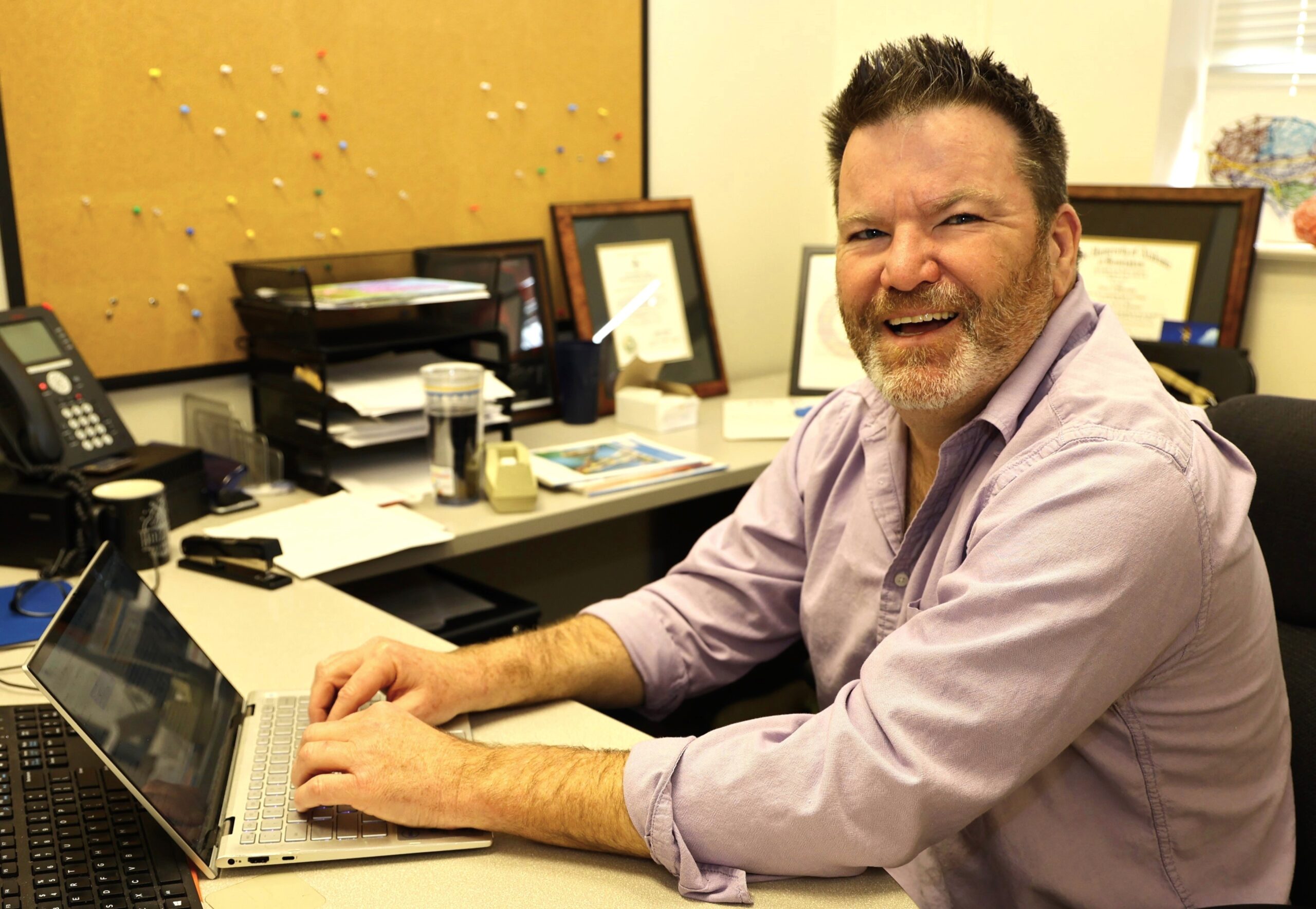
Pictured: Task Force and Assistant Professor of Psychology Dr. Christopher Robinson
By Suzy Alstrin
The endless possibilities of Artificial Intelligence (AI) have the potential to impact and enhance higher education’s learning environment. Reinhardt University’s new AI Task Force, launched in the fall of 2023, embraces this technology and explores uses for its applications for both students and faculty.
The team, comprised of faculty and staff, includes Dr. N. Mason Conklin, director of the Center for Innovative Teaching and Engaged Learning (CITEL) and associate professor of music. He explains, “The AI task force has met on multiple occasions to address AI as a tool in the workforce and as an aid to instruction.” Each member shares their AI interactions, successes, and suggestions regarding academic integrity.
Dr. Conklin finds benefits in using ChatGPT. As the writer of the University’s fifth-year Quality Enhancement Plan (QEP) report, he says it allows him to more efficiently draft and complete this important piece for continuing accreditation. Rather than spending several days writing revisions, he submits his first draft to Chat GPT, requests an academic tone, and immediately gets ideas for improvement. He also reported ChatGPT’s tendency to produce plausible but factually incorrect statements, and explained that students can be transformed by catching these errors, “Knowing that they can’t implicitly trust the output of generative AI helps them learn how to use the tool responsibly.”
Assistant Professor of Psychology Dr. Christopher Robinson attended Auburn University’s “Teaching with AI” course as a member of the task force. He reported that he used AI to find and translate Latin plant and animal names within his historical research on William Bartram and used DALL-E in his classroom to create images. AI was not always correct, he admits, but says it should be kept on hand as a useful and powerful tool. He says it’s best described with an Eleanor Roosevelt quote, “The way to begin is to begin,” explaining, “AI allows me to get kick-started.”
“Our students are going to use AI, so there has been discussion on that. However, the task force doesn’t focus on preventing cheating, but on how to use this great new technology to positively enhance the learning environment,” explained Dr. Robinson.
In November 2023, four students accompanied task force member and Director of Teacher Education Tami Smith to the Georgia Educators Technology Conference where they were told not to be afraid, but to embrace AI. They returned with information and created courses and resource links for professors and students within Canvas, the software that provides assignments, grades, and information.
Her students who plan to be teachers, research forms of AI such as Magic School, Hello History, Eduaide, and upload a presentation of how they would use AI in the classroom to their individual websites. They share their resources and create QR codes for their resumes to link to their tech-savvy web pages.
In the classroom, Smith uses AI as a learning tool, including for financial literacy and creating rubrics. She expounds, “I use Grammarly every day, and there are some stellar programs that can do anything for you. AI is not going away, so it is something we are going to have to learn to embrace. Every day we must learn more and stay a step ahead.” Smith says her team explains to students how to use AI responsibly. Adapting student assignment evaluation methods helps them discern easily whether students are using AI as a directive.
“AI is going to change so many things and how we think about them,” explained Charlotte Ingram, Director of Institutional Research. Ingram uses AI to help her write high-level computer codes to gather data for and about the University by accessing databases.
Although its codes are imperfect, AI gives her a starting point and saves time. Ingram even uses two copilot chatbots to pull from simultaneously, which are intelligent virtual assistants that simulate human conversation and interactions to provide task support. AI also learns from what she codes and suggests things aligned with her previous work. She laughs explaining that when she tells AI that it is wrong, she convinces it to go back and provide different information from a different approach, “Sometimes you have to kick it a little bit. We have to learn how to live with it and manage it.” Ingram is glad to be a part of the Task Force, discussions about ways to utilize AI, and help determine the pros and cons of how it affects education.
With additional uses ranging from exam and lesson plan creations to incorporating AI in assignments and throughout library research, Dr. Conklin plans to alleviate any fears Reinhardt faculty might have about doing so. An experience is planned this Spring where they will gather in the computer lab to investigate AI, brainstorm, and explore additional ideas for incorporating it into learning.

